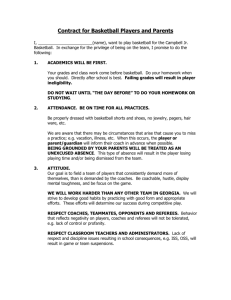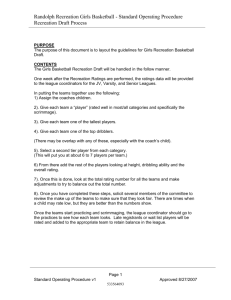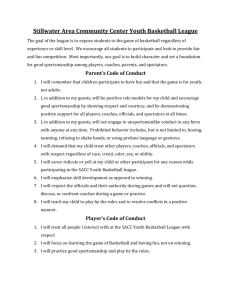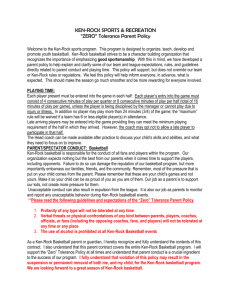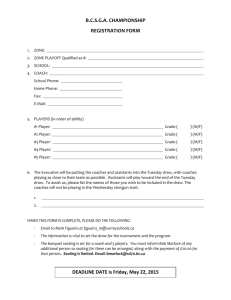A Parents Guide to Youth Basketball
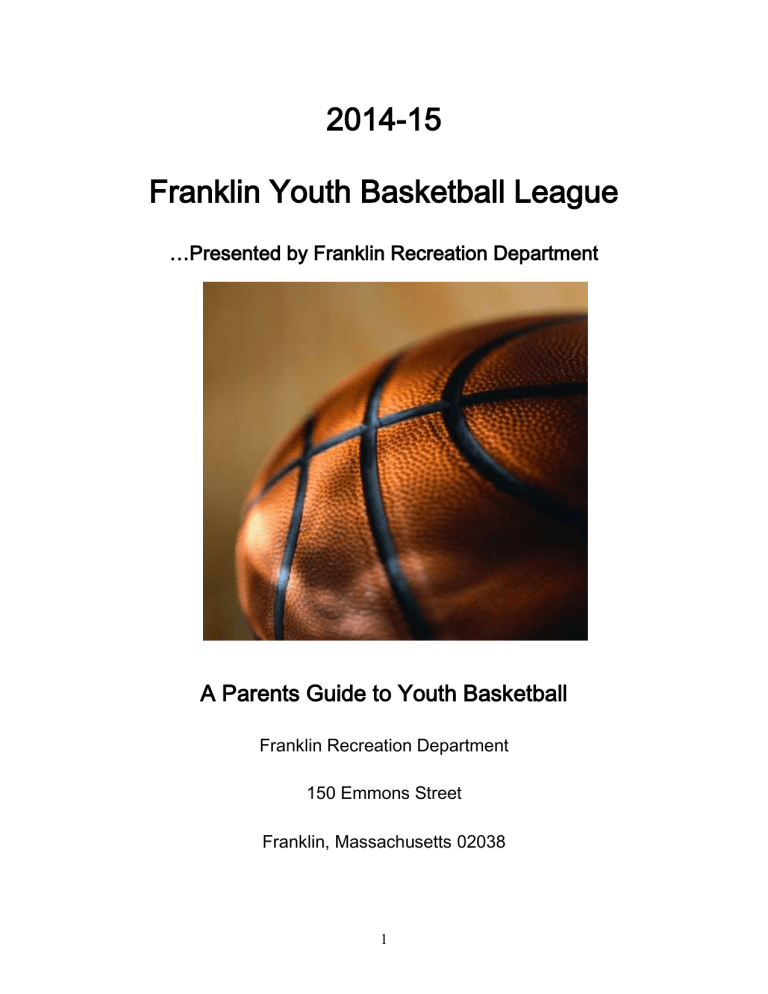
2014-15
Franklin Youth Basketball League
…Presented by Franklin Recreation Department
A Parents Guide to Youth Basketball
Franklin Recreation Department
150 Emmons Street
Franklin, Massachusetts 02038
1
Introduction
The information in this parents guide has been prepared by the Franklin Recreation
Department and is intended as a resource for parents of children involved in the Franklin
Youth Baseball League. In additions, there are other resources available on the
Recreation Departments website at: http://franklinma.virtualtownhall.net/Pages/FranklinMA_Recreation/basket/index
This league is organized and run by the Franklin Recreation Department. The majority of the individuals involved in executing the program are volunteers. Being a part of a basketball team is a proud moment for a child. On behalf of the Franklin Recreation
Department, we’d like to congratulate your child, and wish him/her the best in playing the game and developing new skills. As a member of the Franklin Recreation Basketball program, we are committed to providing a rewarding and healthy experience for all our players. In an effort to make this goal a reality for more children, we’re pleased to provide this guide filled with helpful information.
Mission Statement
It is the mission of the Franklin Youth Basketball League to provide and promote a safe, recreational basketball program for the youth of Franklin. Franklin Youth Basketball
League encourages good sportsmanship, developing strong playing skills, and promoting friendly relationships among the players, coaches, referees and parents.
Board Members
The Franklin Recreation Department relies heavily on volunteers to staff its important roles throughout the different levels of basketball. Because over 1400 children play recreational youth basketball in Franklin, we have divided our league into grades.
Position/Coordinators
Director of Recreation
Kindergarten-2 nd
grade
3 rd
& 4 th
Grade Girls
3 rd
& 4 th
Grade Boys
5 th & 6 th Grade Girls
5 th
& 6 th
Grade Boys
7 th
& 8 th
Grade Girls
7 th & 8 th Grade Boys
High School Intramural
Officials Coordinator
Name
Ryan Jette
Rich Atwood
Bob Pingeton
Mike Canesi
Tim Saunders
Mike Vinson
Mark Eccher
Email .
rjette@franklin.ma.us
ratwood1619@gmail.com
mikecanesi@yahoo.com
TimFranScott@aol.com
franklinhoops@yahoo.com
mmeccher@earthlink.net
Megan Woodacre mwoodacre@franklin.ma.us
Dave Angermeier David.Angermeier@gmail.com
BPingeton@horizonbeverage.com
2
Parents Responsibility
A parent’s fundamental responsibility is to find the right basketball program for your child’s needs before signing them up. For children interested in the game of basketball there are many opportunities to participate at any level of skill and ability. Basketball can be enjoyed in many ways:
Recreation Basketball
Our local Recreation sponsored league, referred to as the Franklin Youth Basketball
League. The Franklin Recreation Department runs this Saturday only league.
Registration starts in August and runs through the first week in October. Skill sessions are evaluations typically run just after registration ends during the second weekend in
October. Skill sessions give us a general idea of a players skill ability so that we can draft teams that will be fair and equitable to the entire league. Without this process, we are taking a risk that teams will be drafted unfairly. This program is open to players from
Kindergarten through 12th Grade. It teaches players the importance of team work, fair play, equal participation and provides positive social interaction with schoolmates.
CYO Basketball
Our local Catholic Youth Organization run basketball program. Joe DePalo and St.
Mary’s Catholic Church run this league to give kids additional competitive basketball choices. Typically, practices run on weeknights and games on Sundays. However, for more information on CYO basketball, please visit the website at: http://www.stmarysfranklincyobasketball.com/
Or you can call the St. Mary’s Rectory phone number at (508) 528-0020
Metro West Basketball
Franklin MetroWest Basketball was created to develop the individual skill of each basketball player, while maintaining a team atmosphere; and to keep the youth of
Franklin involved in the sport of basketball, while still having fun. Metro West
Basketball is a competitive league that has tryouts during the month of October.
Typically, practices will be held during the week and games will be run on Sundays.
Occasionally, Metro West will attend or host tournaments that will run on Saturdays or
Sundays. For more information about the Metro West Basketball League, please visit the website at: http://www.franklinmetrohoops.com/
3
The Facts about Participation
Basketball through the Franklin Recreation Department has provided enjoyment, participation, and memories to children for over 30 years from K-8 grade level.
Recently, we have expanded the season to 18 weeks for more practice and game time.
Franklin Recreation Department also runs an Intramural Basketball Program for boys in grades 9-12. This league is a Franklin/Medway Town League consisting of High School boys. Participation is open to any resident of Franklin and Medway that is a High School student not playing on a freshman, JV or varsity high school basketball team.
This program allows boys and girls in grades K-8 to develop their skills and ensure fair, equal playing time based on our matrix participation system. Schedules & times fluctuate weekly. Players in grades 3 rd
-8 th
participate in our skill sessions to determine player’s abilities. Players in grades K-2 will be placed on teams randomly by school district.
Selecting the Right Basketball Program
There are several things to be considered when selecting any program for your child. The staff in the Franklin Recreation Department can answer your questions regarding the
Franklin Youth Basketball League. You can also visit our website to review this program, as well as other programs that we offer at http://franklinma.virtualtownhall.net/Pages/FranklinMA_Recreation/index
If you are considering signing your child up for another league there is also CYO
Basketball or Metro West Basketball.
What equipment is required?
We suggest wearing sneakers, since you will be playing in a gym and wear comfortable shorts. Once the child is placed on a team we will give them the appropriate game shirt or uniforms.
What is the schedule for practices and games?
Practices for our Kindergarten-2nd grade divisions will not begin until after
Thanksgiving. The practices and games for grades 3-8 will be held on Saturdays beginning in November and ending in March. Practices/games are typically 90 minutes between 8:00 a.m.-8:00 p.m. at various gyms. The Intramural Basketball for boys in grades 9-12 will run Saturday afternoons from 2:00 p.m.-6:00 p.m. starting December and ending in March at the Horace Mann Gymnasium.
What are the qualifications of the coach(es)?
All of our coaches are volunteers. Coaches clinics are held every year before the season starts. We also have a Code of Conduct that we require the coaches to follow. CORI
4
forms are done on all of our volunteer coaches. Regardless, of their experience these volunteers bring knowledge and enthusiasm to your child’s experience.
Do all players play equally?
Our goal is to make every team equal in skill ability. An important aspect of a young player’s development is to be given an equal opportunity to participate in games. At all levels we require coaches to follow the matrix, which matches players of equal skill ability and ensures all kids play during the games.
What if I have other questions?
The Franklin Recreation Department is available to help you with any questions you may have during the season as it pertains to Franklin Youth Basketball League. Also, you can contact your child’s coach if you have any questions about games or playing time.
How can a parent help?
Most importantly, a parent’s role is to support and encourage their child to become the kind of player he or she wants to be and to ensure an enjoyable basketball experience.
Most of the parents volunteer to coach or assistant coach for the Franklin Youth
Basketball League. Parents should encourage practice of skills at home to help your child gain confidence in their abilities.
My son/daughter has made a Metro West or CYO team, can I receive a refund from the Recreation Basketball program?
The Recreation Department is happy to issue a refund to any player one week before the season begins, pending we can find a replacement for your son/daughter. The season officially begins after the skill sessions in October, so after that, no refunds will be issued. It is not fair that your son/daughter be pulled from the Recreation league after they have been placed on the draft list or a particular team. Typically, the Metro or CYO players are the better players in the league and would adversely affect the team/league if they were pulled after the draft. For this reason, we have made it our policy to not refund players after they have attended the skill session. A lot of work goes into making your child’s experience a positive one. Please do your part to help make the program fun for all.
5
Fair Play Policy
FRANKLIN YOUTH BASKETBALL
CODE OF CONDUCT
In order to advance the principles of sportsmanship and fair play and to promote mutual respect among players, coaches, umpires and spectators, the Franklin Youth Basketball
Organization has established a “ Code of Conduct .”
The Code of Conduct shall govern the actions of players, coaches, referees, and spectators. The Code is intended to provide behavioral guidance and establish clear expectations for all involved. The Code was not conceived to address every possible behavioral circumstance; however, it shall serve as the Organization’s standard for behavioral evaluation.
It shall be the obligation of all program participants, spectators and volunteers, to comply with the terms and provisions of the Code of Conduct . Any person violating the Code shall be subject to administrative action, up to and including termination of his/her privilege to participate in, or attend, any of all Franklin Youth Basketball sponsored activities.
MOST IMPORTANTLY
“Enjoy the sport and the competition. Cheer as much as you want. Verbal or physical abuse of fellow players, spectators, coaches or officials WILL NOT BE
TOLERATED”
“We are all here to have fun and enjoy ourselves. Please don’t take the fun out of sports for others.”
6
Guidelines for Behavior for Parents
The Behavioral Guidelines consists with our Fair Play and Code of Conduct guidelines.
Any parent participating in, or watching is expected to adhere to the following guidelines for behavior.
Remember that children and youth participate in sport for their enjoyment, not your own.
Encourage children and youth to participate; do not force them to participate.
Focus on their efforts and performance rather than winning and losing.
Encourage children and youth to always play according to the rules and to settle disagreements without hostility or violence.
Never ridicule or yell at a child or youth for making a mistake or losing the game.
Remember that children and youth learn best by example.
Appreciate good performances and skillful plays by all participants.
Support all efforts to remove verbal and physical abuse from sporting activities.
Respect officials’ decisions and teach children and youth to do likewise.
Show appreciation for volunteer coaches or officials. Without their help the program wouldn’t run as smoothly.
Respect the rights, dignity and worth of every young person regardless of his or her race, national or ethnic origin, gender, sexual orientation, disability, religion, family status or physical appearance.
The Principles of Young Player Development
The Franklin Recreation Basketball has provided enjoyment, participation, and memories for children for over 30 years. Positive experiences in basketball, as well as any sport during childhood are important from a healthy child development perspective, and also from a long-term athlete development point of view.
These principles are important to understand for coaches and parents who are involved.
7
THE CODE OF CONDUCT (Continued)
COACHES
Coaches shall remain unconditionally supportive of the Organization’s commitment to the ideals of good sportsmanship, team play, honesty, loyalty, courage and respect for authority. Likewise, coaches shall remain sensitive to the physical and emotional well being of the players on his/her team. In order to adhere to these doctrines the coaches agree as follows:
Coaches will be positive role models.
Coaches will display and instill in their players the principals of good sportsmanship and team play.
Coaches will conduct themselves in a manner that best serves the interest of the players.
Coaches will do their best to provide the players a positive experience
Coaches will ensure that winning and/or losing teams do so in a manner, which exhibits respect and good sportsmanship.
Coaches will treat all players, parents, spectators and league officials with respect
The following are the 8 principles that help a young basketball player’s growth and enjoyment in the sport:
Support the individual needs of each player
Provide all players with equal opportunities to actively participate
Encourage players to learn through discovery
Ensure that each player feels connected to the team
Establish supportive practice and competitive environments
Develop general athleticism
Recognize training limitations of an individual player
Enhance perceived competency of the player
8
The Game of Basketball
The game of Basketball was invented by Dr. James Naismith. He was born in Almonte,
Ontario in 1861. Following graduation from University in Montreal he became a teacher at Springfield College in Massachusetts. During his time there he invented a new indoor game with two main objectives: “make it fair to all players” and “free of rough play.” It was inspired by a game he played during his childhood on his family farm. On
December 21, 1891 the first game of basketball was played at the college. It became more widely known by 1892 and was the foundation of the game that is played today.
After more than 100 years the spirit of Dr. Naismith’s game is evident in the enjoyment by many young players. Visit the Naismith’s Museum and Hall of Fame at www.naismithmuseum.com
for more about Dr. Naismith and his life.
Dr. Naismith designed basketball to be a game without physical contact, to avoid rough play and injuries. It is a simple yet challenging game.
These are the original 13 rules of the game:
1.
The ball may be thrown in any direction with one or both hands.
2.
The ball may be batted in any direction with one or both hands (never a fist)
3.
A player cannot run with the ball. The player must throw if from the spot on which it is caught.
4.
The ball must be held in or between the hands; the arms or body must not be used for holding it.
5.
No shouldering, holding, pushing, tripping or striking in any way the person of an opponent shall be allowed.
6.
A foul is striking at the ball with a fist, violation of rules 3,4&5.
7.
If either side makes three consecutive fouls it shall count as a goal for the opponents.
8.
A goal shall be made when the ball is thrown or batted from the ground into the basket and stays there, providing those defending the goal do not touch or disturb the goal. If the ball rests on the edge, and the opponent moves the basket it shall count as a goal.
9.
When the ball goes out of bounds, it shall be thrown into the field and played by the person first touching it. It can be held unmolested for five seconds.
10.
The umpire shall be the judge of the men and women and shall notify the referee when three consecutive fouls have been made. He shall have the power to disqualify players.
11.
The referee shall be the judge of the ball and shall decide when the ball is in play, in bounds, to which side it belongs and shall keep the time. He shall decide when a goal has been made and keep account of the goals.
12.
The time shall be two 15 minute halves with five minutes rest between
13.
The side making the most goals in that time shall be declared the winner. In the case of a draw the game may, by agreement of the captains, be continued until another goal is made.
9
The Game of Basketball
In an official game of basketball there are two teams. Only five from each team are allowed on the court at one time.
Who Does What?
Your child’s coach will determine how best to organize players according to their skills and abilities. The coach will assign positions at the start of the game, but every player must be able to shoot and defend.
There are two forwards who do most of the shooting closest to the basket. The center, who is also a shooter, must be good at rebounding-getting the ball from a failed shot as it bounces off the rim or backboard. This is necessary at both ends of the court. Two
Guards will play outside the area of the forwards. The guards are often the quicker player and have the job of making plays. They will pass the ball to the forwards when they are in a scoring position.
Other important roles
Officials -
There are usually two, known as the referees. Their job is to ensure the game is played according to the rules. They are “in charge” of the game and have the final say. Please respect our officials and treat them as you would wish to be treated. These are young kids trying to help our program. They will not tolerate misbehavior of parents, coaches or players.
Minor Officials -
These are the scorer and timekeeper, usually a volunteer role and vital to the game. Their job is to notify the referees of possession changes, time of the game, and to keep score of the game. They are not there to track fouls or keep personal statistics.
Scoring-
There are two possible ways to score in the game-field goals and free throws. A field goal, which is scored from a play action within the three-point line is worth two points.
A goal scored from outside the three-point line is worth three points. A free throw, worth one point, is awarded to a player who has been fouled. A free throw is shot from the free throw line with all the other players aligned along the key area. When a player is shooting a free throw, the players and spectators are expected to be quiet, as a courtesy.
Fouls-
Fouls are assessed as a result of a violation of the rules and/or to and before contact between players. The Officials identify all fouls and assess the penalty according to
National Federation Of High School Rules. The purpose is to ensure that every coach will embrace the Principles of Young Player Development and provide every child with a successful game experience
. Parents should expect their child’s coach to observe these rules at all times.
10
The most common fouls are Personal Fouls, which include: holding, pushing, charging and tripping. These usually result in a change of possession. Or, if the action is against a player who is in the process of shooting, the referee will award one or more free throws to the offensive player. When a player has been charged with the fifth personal foul, he or she can no longer play in the game.
A Violation is a lesser foul usually as a result of a player infringing the dribbling rule, or a team not leaving its own half within 10 seconds and other Basketball rules.
Another type of foul, known as a Technical Foul can be assessed against players, coaches, assistant coaches and managers who are in violation of certain rules. Technical
Fouls include: delay of play, coaches’ violations and unethical or disrespectful behavior.
These can result in free throw shots for the other team. Too many technical fouls can result in ejection from the game and possible suspension from future games.
Parents can learn more about the rules and official’s signals by visiting this website.
Franklin Youth Basketball League Rules
11
Equal Participation Rule
Our goal as the Franklin Recreation Department is to provide an opportunity for players of different skill abilities to participate equally in the game of basketball. To provide, a fun experience for every player regardless of skill level to promote the concept of team unity, companionship, instruction and learning experiences to the best of the coaches ability.
Rules
1) Each game will consist of eight (8), five (5) minute periods. Overtime periods will be three (3) minutes. Overtime period #1 will have the 8 th
period players.
Overtime period #2 will have the 7 th
period players. The third overtime periods will be “sudden death,” with period #6 players.
2) Time will be kept by a timekeeper on the sidelines (not the referee or coach).
Time will generally be considered “running time” but will be stopped on time outs and all whistles in the last 2 minutes of the game.
3) Man to man defense should be used at all times. (Except zone defense in leagues that vote this in the night of the draft).
4) 7 th
& 8 th
grade leagues only, full court press in periods 6 & 8 is in effect unless the opposing team is leading by 20 or more points. A technical foul violation will be called after one (1) warning.
5) The offensive team will be allowed 10 seconds to get the ball across half court.
6) There will be no picks allowed at half court. Referees will call fouls for illegal picks.
7) A player is not allowed to stand in the paint for more than three seconds without the ball hitting the rim.
8) Back court violation will be called
9) Five (5) personal fouls removes a player from the game. Replacement must come from a player who is not on of the top four (4) whenever this is possible. If this is not possible the order of use must be from the fourth rated player down to the first. Also the replacement players should be divided evenly throughout the remainder of the game so as to maintain even playing time. (Opposing coach decides). A player in foul trouble (3 or more) may be substituted. However, subs must come from the second unit, not the top four players.
12
Person To Person Defense Rule
Rule
Every defending player MUST be assigned an opposing player to defend. This will occur at the beginning of each player’s shift. Every player must be defending
ONLY his or her assigned player at all times inside the boundaries of the 3 point field goal line of the front court. They should be within one stop’s proximity to the assigned player and make defensive moves associated with the movement of the offensive player.
Person To Person Defense Rule Exception: Help and Recover
This exception can only occur inside the boundaries of the 3 point field goal line of the front court. If the offensive ball handler has dribbled past their defensive player toward another defensive player, that defensive player being the closest defensive player to the on-coming dribbler can leave their defensive responsibility to stop the dribbler’s progress. The original defender of the dribbler must then rotate to find the open offensive player to defend. There could simultaneously be a rotation of the remaining defensive players to temporary defensive responsibilities.
Purpose
Shooting with purpose at game intensity in training cannot be under estimated. What is meant by purpose? Purpose means a player must set goals and try to reach them. But it is not only setting a goal, but trying to be better than you were before. Teach your players to forget competing against their teammates and opponents when trying to measure their success. Coach Rowe has had players approach him when given an assignment on court saying "but that guy is too good" - his response to this is, "he is only as good as you let him be". His point is the only competition you are guaranteed of winning is the one against yourself! Every time you train or step on a court you should try to be better than you were before you or the coach should accept and expect nothing less than this regardless of the outcome.
Shooting with purpose when training means, if you shoot ten shots at five different spots, you should set a goal to make greater than 50%. If you don't make 50% at a spot give yourself a penalty of push-ups or a suicide run. Once you consistently make 50% at each spot, you move the goal post and make it 60%, that way you will know you will be better.
When you are consistently making 10 shots at each spot, again change the goal post, make it 15 or 20 shots at each spot.
You should do this for all shooting drills no matter what the shot it is. But it is not enough just to do it, you need to record your makes from takes somewhere and then graph them over a period of time to see your improvement. A shooting program has been provided on the Programs page.
Intensity
To shoot is one thing, but to shoot at game intensity and in games situations is another!
The saying is, "You play as well as you train." Once you have established and practiced a technique and it is reasonably sound. You must get out of your comfort zone and work to
13
use that technique at game intensity, receiving on the move and tired, because this is how you often have to shoot in the game. Use of a "throw-back" is ideal for a player to practice shooting at game intensity if one is available.
Many players practice shooting and just throw the ball up from different spots. They neglect a whole chain of events that leads to those shots in games. For example in their practice they may fail to square up, shot or foot fake, drive or do one or two dribble shots and jumpers. You see it is the quality of training that makes a player a good shooter. For example a player who practices a shot fake-one dribble-jump shot from 5 spots, is going to have more chance of scoring this way in a game than the player who just practiced shooting from spots.
Effective use of the imagination (imagery) is important when practicing shooting on your own. You must pretend to see the defense and what option they have given you.
Therefore the player, who practices the shot fake shot or drive, has effectively imagined their opponent's reaction to the fake, even though the opponent is not there. But when the opponent is there, will this shooter's actions and reactions be any different? Probably not!
Effectively what you are doing when you do any training is reinforcing good habits. The more we do something the less reliant we become on thinking about doing it. In sport this reinforcement is known as "Muscle Memory" that is the training of our mind to send signals to the muscles in reacting to certain situations to obtain a result without any real thought going into the desired result. More common language is to refer to it as “second nature”.
Penalties:
The referees have been through a referee clinic this year and have been trained for the leagues. They are in complete charge of the game and may eject a player or coach for unsportsmanlike conduct if necessary to keep control of the game. The referee may call a technical foul against any player or coach if necessary. If there is two (2) technical fouls on the same player it results in automatic ejection.
Penalty free throws will be taken starting on the 7 th team foul in a half. Penalty fouls will result in one and one and the clock is stopped. 2 foul shots will be taken starting on the
10 th
team foul in a half.
Protests
A protest will be honored but only under the following guidelines
It must be made known to the referee prior to the end of the game involved. The referee will notify the league coordinator and Recreation Department.
The protesting coach must submit it in writing to the league coordinator the nature
of the protest, the reason, who involved, etc.
This action must occur before 9:00 a.m. on the Monday morning immediately following the day the game was played.
Referees judgment calls are not protestable
14

